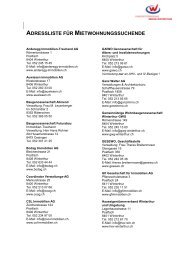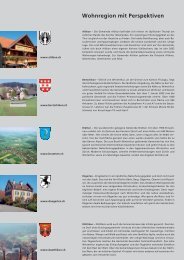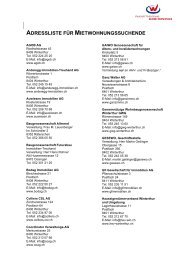Handbook for Investors. Business location in Switzerland.
Handbook for Investors. Business location in Switzerland.
Handbook for Investors. Business location in Switzerland.
Create successful ePaper yourself
Turn your PDF publications into a flip-book with our unique Google optimized e-Paper software.
8.6.1 Old age and survivors’ <strong>in</strong>surance (OASI)<br />
OASI provides old-age benefits (retirement pension) or benefits<br />
to dependants (widows’ and orphans’ pensions). The benefits<br />
depend on the amount of previous <strong>in</strong>come and the amount of time<br />
<strong>for</strong> which contributions were made. OASI <strong>in</strong>surance is mandatory<br />
<strong>for</strong> everyone who lives or works <strong>in</strong> <strong>Switzerland</strong>. The <strong>in</strong>surance is<br />
based on the pay-as-you-go system: People who are work<strong>in</strong>g today<br />
fund the pensions of today’s retirees. All men and women who<br />
work <strong>in</strong> <strong>Switzerland</strong> are required to contribute, with the employer<br />
pay<strong>in</strong>g half of the contribution and the employee the other half.<br />
8.6.2 Disability <strong>in</strong>surance (DI)<br />
The aim of disability <strong>in</strong>surance is to help <strong>in</strong>tegrate or return persons<br />
who are disabled due to birth defects, illness or accidents (<strong>in</strong>)to the<br />
work<strong>for</strong>ce. A pension is paid out only when the person is unable<br />
to take up employment or return to his/her job. Contributions are<br />
mandatory and are levied together with OASI contributions.<br />
8.6.3 Accident <strong>in</strong>surance<br />
Accident <strong>in</strong>surance covers all persons employed <strong>in</strong> <strong>Switzerland</strong><br />
aga<strong>in</strong>st accidents <strong>in</strong> the workplace, occupational illnesses and,<br />
<strong>in</strong> pr<strong>in</strong>ciple, aga<strong>in</strong>st non-occupational accidents. Healthcare and<br />
ancillary needs (treatments, required medical aids, travel and<br />
transport costs) and payments (daily benefits allowance, disability<br />
pensions, settlements, lump-sum compensation and perpetual<br />
care benefits and survivors’ benefits) are all covered. The employer<br />
funds the premiums <strong>for</strong> occupational accidents and illness, while<br />
the employee pays the premiums <strong>for</strong> non-occupational accidents.<br />
The employer must f<strong>in</strong>ance the entire premium amount, but part of<br />
this amount is deducted from the employee’s salary. The amount<br />
is based on the employee’s <strong>in</strong>sured salary. The maximum <strong>in</strong>sured<br />
salary is CHF 126,000 per year.<br />
8.6.4 Health <strong>in</strong>surance and daily sickness benefits<br />
Mandatory health <strong>in</strong>surance offers cover <strong>for</strong> illness, pregnancy<br />
and accidents, where there is no accident <strong>in</strong>surance <strong>for</strong> this.<br />
Employees are free to choose their policy. Everyone has the right<br />
to basic <strong>in</strong>surance regardless of their health or age. In addition,<br />
voluntary supplementary policies can be taken out (generally<br />
requir<strong>in</strong>g a health check). Premiums are charged per person, not<br />
based on <strong>in</strong>come. The amount of the premium depends on the<br />
amount of the division of costs chosen (CHF 0 – 2,500 + 10 % of<br />
the costs up to a maximum of CHF 700) and the municipality<br />
where the <strong>in</strong>sured person lives, averag<strong>in</strong>g CHF 323 per month<br />
(2009). Employers do not generally make health <strong>in</strong>surance contributions.<br />
Daily sickness benefits are voluntary. Their cost depends on the<br />
scope of cover (illness, maternity, accident), and the premiums<br />
can be divided 50:50 between the employer and the employee.<br />
If group <strong>in</strong>surance is not arranged <strong>for</strong> employees, employers are<br />
obliged to pay employees their full salary <strong>for</strong> a certa<strong>in</strong> period (depend<strong>in</strong>g<br />
on years of service) if they are unable to work through no<br />
fault of their own. That is why many employers take out daily sickness<br />
benefits <strong>for</strong> their employees. Maternity and accident/illness<br />
benefits are treated equally when salary payments are cont<strong>in</strong>ued.<br />
If a pregnant women cannot attend work <strong>for</strong> health reasons, she<br />
is entitled to her full salary <strong>for</strong> a certa<strong>in</strong> period of time.<br />
Federal Office of Public Health<br />
www.bag.adm<strong>in</strong>.ch<br />
L<strong>in</strong>k: Topics/Health <strong>in</strong>surance<br />
Languages: German, English, French, Italian<br />
Federal Office of Public Health<br />
www.bag.adm<strong>in</strong>.ch<br />
L<strong>in</strong>k: Topics/Accident and military <strong>in</strong>surance<br />
Languages: German, English, French, Italian<br />
Comparison of health <strong>in</strong>surance premiums<br />
www.comparis.ch<br />
Languages: German, English, French, Italian<br />
<strong>Handbook</strong> <strong>for</strong> <strong>Investors</strong> 2010<br />
77









